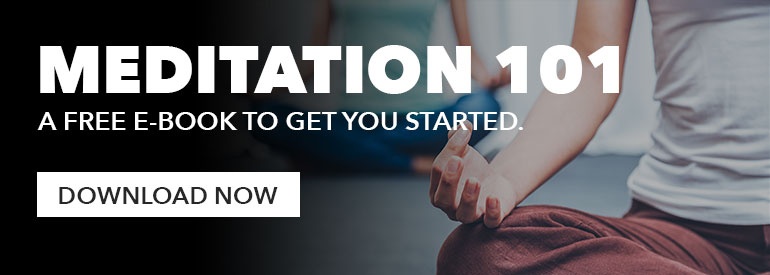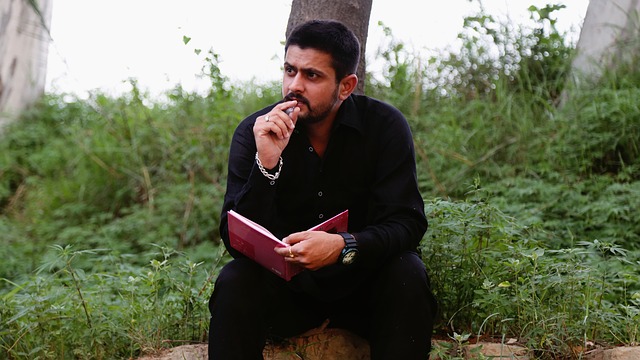 Reading Time: 8 minutes
Reading Time: 8 minutesDo you spend much of your life “in your head,” analyzing decisions you’ve made, going over things you could have done better? Do you rehearse upcoming conversations, try to anticipate others’ reactions, or attempt to plan future activities down to the smallest details? Do you feel exhausted by this drain of mental energy, and find yourself unable to make decisions?
If so, chances are you’re an overthinker. The good news is, you’re not alone.
As humans, we have been blessed with incredible brains. These thinking machines help us navigate life — keeping us safe while performing complex tasks with little conscious effort. Unfortunately, the analytical part of our brain can turn against us so we become stuck in a loop of overthinking.
If we spend too much time in this state of overthinking, we may find ourselves in a spiral — we get so caught up in self-doubt, confusion, and frustration that we feel plagued by indecision. It begins to impair our ability to thrive in daily life. The constant bouts of overthinking can also have serious health consequences including increased stress, exhaustion, high blood pressure, sleeplessness, and feelings of anxiety.
Thankfully, there is help at hand. With a little practice, we can reduce the burden of overthinking and let go of the need to hyper-analyze and over-control. Instead, we can boost our capacity for calm, rediscover clarity, and increase our enjoyment of life.
What Is Overthinking?
Let’s start by exploring what overthinking is. For some, it can be likened to a whirlpool of constant thoughts and internal questioning. It might start with a seemingly small issue — a note on our desk that our boss wants to see us, or an unanswered phone call to our partner, or the lack of a smile from our friendly barista at the local café.
Overthinking can take this small issue and blow it out of proportion. In the mind of an overthinker, a note from the boss can play out like this: “What does she want? I must have done something wrong. I wonder what it was? I worked so hard on that last project. Is she going to sack me? I can’t believe it! What will I do if she does sack me? How am I going to hold it together? Now I feel sick thinking about it.”
From the outside, this type of thinking seems illogical. But inside the mind of an overthinker, this constant cycle of thought feels real. Each unanswerable question leads to another, the thoughts grow and multiply until they take on a life of their own. Previous conversations get replayed and twisted out of context. Within a short time, our overthinking can create a problem out of something innocent, and we might start behaving as if that problem were real. This, in turn, creates more problems.
Clearly, continued bouts of overthinking can have serious consequences on our career, relationships, interactions with friends and family, and our quality of life.
Another side of overthinking is the need to analyze, anticipate, and control the future. The logical part of our brain goes into overdrive — planning the when, where and what-ifs of all potential scenarios. Conversations are rehearsed in our heads, hypothetical arguments are anticipated and rebutted, situations are scripted and practiced, and all possible outcomes are explored so we can feel in control. Enormous amounts of energy are expended on predicting everything that could happen, and how we should respond when it does.
This trap of overthinking means our capacity to make decisions and move forward is diminished. We spend so much time in our heads that not much gets done. This can leave us feeling stuck, confused, and frustrated.
Life by its nature is unpredictable and we cannot control the actions — or reactions — of others. Too much plotting and planning becomes wasted time, simply because we can’t predict how others will respond.
What Is Not Overthinking?
Overthinking is different from deliberation and reflection. The process of inner examination is a worthwhile endeavor that focuses on learning from our mistakes, considering our strengths and weaknesses, and making constructive use of our past experiences. Whereas overthinking tends to focus on relatively small concerns, blowing them out of proportion by getting stuck in a cycle of confusion and indecision.
Overthinking is also different from productive planning. Assessing the future from an objective perspective and planning appropriately is a helpful and useful activity. Being adequately prepared helps us feel confident in moving forward. On the other hand, getting stuck in overthinking can leave us feeling unsure, worried, and unable to take action.
Now that we’ve defined what overthinking is and is not, let’s explore five practical strategies to stop the cycle and enjoy a more productive, fulfilling life.
1. Take a Break
As we’ve seen, overthinking can escalate if left uninterrupted. Distracting our thoughts by rechanneling them into another activity can be useful for breaking the cycle.
This could be calling a friend, watching a funny YouTube clip, going to the gym, playing a sport, gardening, meditating, reading a book, seeing a movie, writing in a journal, walking around the block, spending time with your kids, taking your dog to the park, painting, listening to music, cooking, etc.
The distracting activity provides a circuit breaker and gives your mind a rest from the repetitive cycle of thoughts.
Note that the point here is to give your brain a time-out. It is not to suppress negative thoughts or emotions or to avoid dealing with problems. Since overthinkers have the potential to ruminate, the goal of the distracting activity is to allow a more balanced and objective perspective on the issue at hand.
Also, it is important to choose a useful and healthy activity. Indulging in activities such as emotional eating or drinking alcohol to numb the brain may feel good at first. But these activities can backfire and lead to additional problems.
2. Be Mindful
Overthinking is based on future worries or past concerns. It is completely devoid of the present — what is really going on, right now, in this moment.
If you get stuck in an overthinking loop, try using a mindfulness practice to bring you back to the present. For example: touch and feel the texture of your shirt, the floor under your feet, the chair under your thighs, the hair on your head, the breeze on your face, or the sunlight on your skin.
The physical act of touching these things — and noticing how they feel — can bring you back to the here and now, and away from future or past concerns. It can help stop the swirling thoughts, allow you to take a breath, and refocus on what is real and known.
3. What Could Go Right?
The mind of an overthinker tends to dwell on potential negative outcomes. Try turning this on its head. Instead of thinking of all the ways something could go wrong in the future, shift your thoughts to all the ways it could go right.
Let’s use the earlier example of receiving a note from the boss wanting to see you. Instead of the negative predictions, explore some positive possibilities. She might want to reward your recent hard work by taking you out to lunch. Or perhaps there’s a new project coming up that’s she’d like you to handle. Maybe she wants to pick your brain about improving processes.
Similarly, instead of dwelling on times when things went wrong, remember and savor the times that went well. What went right? How did you learn from them? What were the things you’re grateful for?
4. Refocus
Overthinking can be a clue to what’s important to you. Rather than trying to repress overthinking, notice what topics or aspects of your life you tend to overthink. Refocus that logical brain and ask yourself:
- Is this thing important to you?
- What about it is important to you?
- Is thinking about it useful?
- What is the tangible benefit of thinking about it?
- Is there something practical you can do about it?
- How can you do that thing?
- When can you do that thing?
These questions can help pull your focus back to whether the situation is real or imagined, whether thinking about it is useful, and if there’s something you can do about it.
5. Schedule It In
Sitting down to think and reflect is a useful and rewarding activity. Rather than trying to ignore issues or tell yourself you “shouldn’t” be overthinking, schedule a time to sit and think. Keep a list of your concerns and thoughts if you need to. Then, when it comes to your scheduled time, set a timer (perhaps fifteen minutes) and allow yourself to sit and think through your list. It might help to write down all the thoughts and feelings that come up in a journal.
This strategy takes the immediacy out of overthinking and allows quiet time to evaluate — without trying to do other things at the same time. It also puts the issue into context. When a worry appears inside our head, it can grow exponentially until it absorbs all our attention. It can seem very real and very large. By putting that issue aside, and scheduling appropriate time to think about it, we can recognize that the worrisome matter may be smaller than we thought, and less overwhelming to deal with.
It’s Time to Stop Overthinking and Start Living Instead
Life can be chaotic and it’s normal to try to make sense of the world. But overthinking — and trying to control our lives and anticipate the actions of others — is exhausting and counterproductive. Things rarely turn out as we expect them to, and the most joyful experiences often happen through chance and randomness.
We cannot truly embrace life if we’re stuck in the past or worried about the future. By letting go of overthinking, we can learn to thrive — not just survive.













